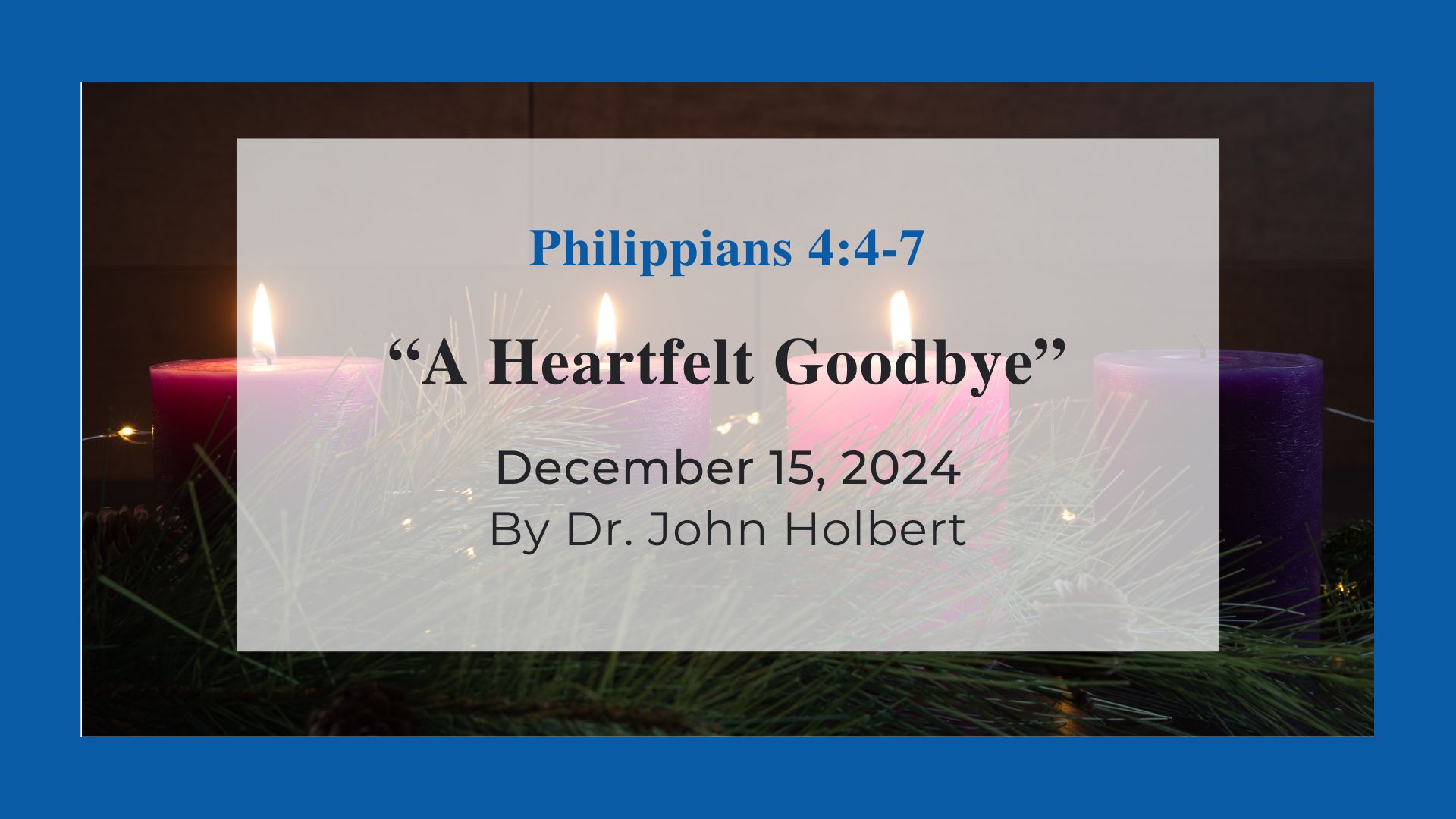A Heartfelt Goodbye Reflections on Philippians 4:4-7 for Advent 3, YearC
by John Holbert on Friday, November 29, 2024

Since I addressed Luke 3:1-18 last week for Advent 2 (and the lectionary collectors divide Luke 3:1-6 from Luke 3:7-18, making it the subject for two Advent weeks), I have turned to look at Philippians 4:4-7 for Advent 3. This section from the final chapter of Paul’s letter to the Philippian Christians is justly famous, being employed for centuries as a felicitous way to conclude a worship service, a delightful benediction and admonishment for those congregants about to reenter the world in which they live.
This letter is among Paul’s most personal ones in which he prays fervently for the emerging congregation while he is imprisoned (Phil.1:15), informing them, and also certainly speaking to himself, that his ministry must continue to the known world. In addition, there is that unforgettable metaphor in Phil 2 of “Christ Jesus emptying himself” on behalf of his followers, “not regarding equality with God as something to be exploited,” but “taking the form of a slave,” and thereby becoming “obedient to the point of death—even death on a cross” (Phil. 2:5-7). This famous “Christ Hymn,” a piece that may have preceded Paul’s use of it, has become for many since a true hallmark of a rich understanding of the work of Jesus for us through his life and death.
After that theological tour de force, the apostle takes on a very real problem in the community when he urges two women to “be of the same mind in the Lord,” using the same word he has just used at Phil.2:5 to urge Euodia and Syntyche to cease their quarrels and to live in peace with one another (Phil.4:2). And then he takes his leave in the letter by employing a word that can have at least two quite different meanings. The usual translation is, of course, “rejoice,” a word used regularly in this letter and elsewhere in Paul’s correspondence. Many of us have the admonition memorized: “Rejoice in the Lord always; again I will say, Rejoice” (Phil.4:4). However, it appears that the word at this place in the letter can also mean “farewell” or “goodbye.” In that sense, it may well have the same connotations as Hebrew “shalom” or even Hawaiian “aloha”.
Similarly in Hebrew, the word “baruch” can mean both “blessed” or “happy”. For example, in Ps.1 the beginning may be read either “blessed are they” or “happy are they.” Perhaps it is best to include both meanings together to gain a fuller sense of is being said. Why not then think the same thing here in Philippians? “Rejoice and goodbye,” says Paul to his beloved Philippian community, and repeats the joyous farewell to emphasize his deep affection for them. “Let your generosity be known to everyone.” Paul does not urge them to be generous; he announces that they already are generous, but admonishes them to demonstrate their wonderful generosity to all. He adds, “The Lord is near,” apparently as a way to affirm to them that their way of living has been and will soon be approved by the coming of the Lord, who is ever near. Both Hebrews 10:37 and James 5:8,9 offer the same affirmation to their respective communities about the nearness of Jesus Messiah.
“Do not worry about anything,” in the light of the Lord’s closeness, “but let all requests be made known to God by prayer and supplication.” The Philippians are hardly alone but are loved both by Paul and by God who is always ready to hear and respond to their needs. Then comes the famous benediction: “The peace of God, which transcends all understanding, will protect your hearts and your minds in Christ Jesus” (Phil.4:7). God’s peace is expressly claimed by Paul to be in the business of guarding, protecting both heart (here as in Hebrew anthropology the seat of will and intelligence) and mind, a word also meaning purpose. Thus, God’s peace, says Paul, will guard both will and purpose, helping the Philippians focus attention on their generosity for one another and for the world.
And all of this stems from the self-giving love of Jesus, that one who emptied himself for us, and offered for us the model of ultimate generosity that Paul announces is the very essence of the church of Philippi. What better text to address on this third Sunday of Advent, the Sunday of joy!
